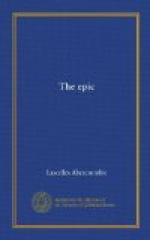For the vehicle of this motive, a fable of purely human action would obviously not suffice. What Milton has to express is, of course, altogether human; destiny is an entirely human conception. But he has to express not simply the sense of human existence occurring in destiny; that brings in destiny only mediately, through that which is destined. He has to express the sense of destiny immediately, at the same time as he expresses its opponent, the destined will of man. Destiny will appear in poetry as an omnipotent God; Virgil had already prepared poetry for that. But the action at large must clearly consist now, and for the first time, overwhelmingly of supernatural imagination. Milton has been foolishly blamed for making his supernaturalism too human. But nothing can come into poetry that is not shaped and recognizable; how else but in anthropomorphism could destiny, or (its poetic equivalent) deity, exist in Paradise Lost?
We may see what a change has come over epic poetry, if we compare this supernatural imagination of Milton’s with the supernatural machinery of any previous epic poet. Virgil is the most scrupulous in this respect; and towards the inevitable change, which Milton completed and perfected from Camoens and Tasso, Virgil took a great step in making Jupiter professedly almighty. But compare Virgil’s “Tantaene animis celestibus irae?” with Milton’s “Evil, be thou my good!” It is the difference between an accidental device and essential substance. That, in order to symbolize in epic form—that is to say, in narrative form—the dualistic sense of destiny and the destined, and both immediately —Milton had to dissolve his human action completely in a supernatural action, is the sign not merely of a development, but of a re-creation, of epic art.
It has been said that Satan is the hero of Paradise Lost. The offence which the remark has caused is due, no doubt, to injudicious use of the word “hero.” It is surely the simple fact that if Paradise Lost exists for any one figure, that is Satan; just as the Iliad exists for Achilles, and the Odyssey for Odysseus. It is in the figure of Satan that the imperishable significance of Paradise Lost is centred; his vast unyielding agony symbolizes the profound antinomy of modern consciousness. And if this is what he is in significance it is worth noting what he is in technique. He is the blending of the poem’s human plane with its supernatural plane. The epic hero has always represented humanity by being superhuman; in Satan he has grown into the supernatural. He does not thereby cease to symbolize human existence; but he is thereby able to symbolize simultaneously the sense of its irreconcilable condition, of the universal destiny that contains it. Out of Satan’s colossal figure, the single urgency of inspiration, which this dualistic consciousness of existence makes, radiates through all the regions of Milton’s vast and rigorous imagination. “Milton,” says Landor, “even Milton rankt with living men!”




